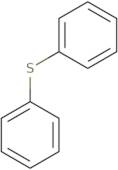Informations sur le produit
- Diphenyl Sulfide
- (Phenylsulfanyl)benzene
- 1,1'-Sulfanediyldibenzene
- 1,1'-Thiobis(benzene)
- 1,1'-Thiobisbenzene
- Benzene,1,1'-thiobis-
- Diphenyl monosulfide
- Diphenyl sulfide
- Diphenyl sulphide
- Diphenyl thioether
- Voir d'autres synonymes
- Diphenylmercaptan
- Diphenylsulfane
- Diphenylsulfid
- Diphenylthiamethane
- Nsc 4568
- Phenyl sulphide
- Phenylthiobenzene
- Sulfide, diphenyl
- Sulfure de diphenyle
- Sulfuro De Difenilo
- Phenyl sulfide
Phenyl sulfide is a model system for studying the reaction mechanism of sulfoxidation. It is also an antimicrobial agent that shows activity against bacteria, fungi, and viruses. Phenyl sulfide has been shown to reduce the size of tumors in rats by inhibiting their growth. Phenyl sulfide may be metabolized by microorganisms present in the body to produce diphenyl and sulfur dioxide gas. The diphenyl group may react with nitrous acid or nitrite to form diphenylnitrosamine (DPN), which causes DNA mutations and cancer. The sulfide group in phenyl sulfide reacts with oxygen to form hydrogen sulfide (H2S), which is toxic to cells because it inhibits mitochondrial respiration. Radiation can cause the formation of free radicals that react with phenyl sulfide, forming a variety of reactive molecules that can damage cells and tissues.





